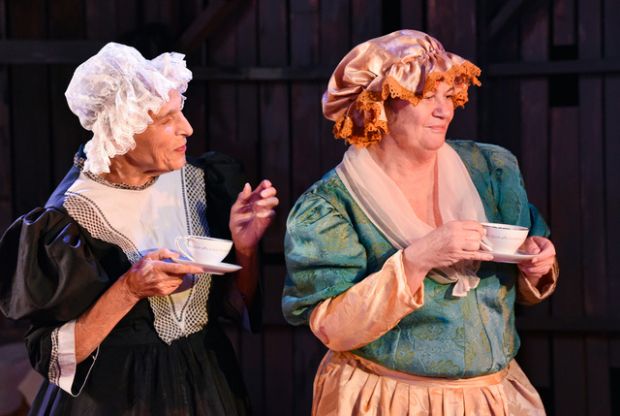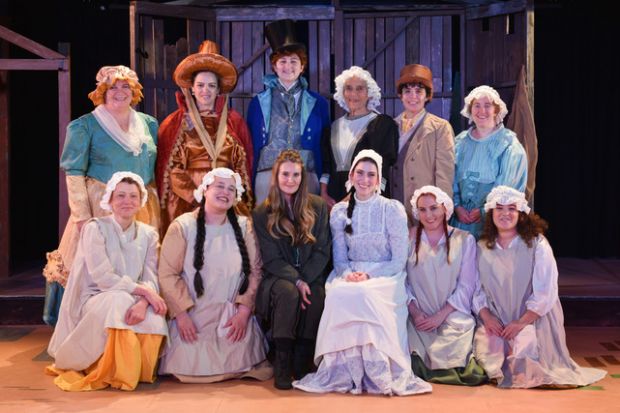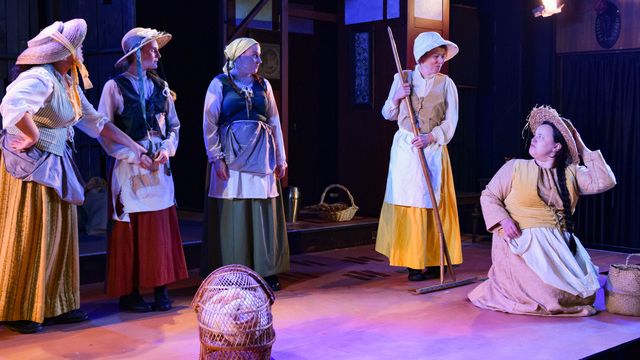The Ballad of Maria Marten
In 1827, in a little town called Polstead in Suffolk in the UK, a girl called Maria Marten disappeared. It was not until a year later that her body was discovered under the floorboards of a barn. She had been shot, strangled and hit with a spade by William Corder, the man she loved. The same man who had abused her psychologically in a nasty form of coercive control. The “Murder in the Red Barn”, Corder’s trial and very public execution are part of Suffolk history.
Beth Flintoff re-tells that history through the eyes of Maria. She tells it with perceptive insight, focussing on “what Maria was rather than what was done to her”. She recreates village life in the 1820s, the different social classes, wealth, poverty, education, the position of women. She recreates a Maria, who is fun-loving, caring, hard-working, loved, trusted … and trusting.
Jennifer Willison’s all female production is true to Flintoff’s interpretation of the time. The costumes (JAS Enterprises) and the rustic set designed by Wayne Chee, take the audience back to a simpler time, where village people worked the land and paid rent to the squire. The characters with their soft Suffolk burr and their simple acceptance of their lot come gently to life under Willison’s discerning direction.

The play begins with Maria coming back to life to tell her story.
Emerging from the darkness of the barn, she gazes into the audience and explains, simply and graphically, how she died. How she lay, hidden under the floorboards of the barn for a year while people searched for her – or forgot about her.
Laura Stead establishes a very real Maria who reaches through the fourth wall to fix the audience with glittering eyes that almost accuse, until she breaks away and becomes a young Maria at the beginning of her story – a lively, vibrant, intelligent Maria, who is literate (she was taught to read by one of the local gentry) and a leader among her friends. She is playful, observant, and as she grows older, aware of her attractiveness. Stead takes her through the loss of a child, the pain of rejection, the joy of love and the confusion of intimidation and mental abuse.
Her friend Phoebe Stowe, played by Chiara Helena Arata, is a constant throughout her life, ready to join her in games, search her out when she is shut away by Corder with a newborn child, protect her when his coercive taunts and lies break her spirit. Arata makes Phoebe caring, sincere, supportive and strong.
Kimberlea Smith is Lucy Baalham, hesitant and god-fearing, with a domineering mother. Smith shows her caution in tentative reactions and wide-eyed expressions, emphatic denials … and a bitter, heartfelt admission as Corder goes to trial.
Another village girl who suffers at the hands of her husband is Theresa Havers, played by Genevieve Sky. Sky shows the real fear of the abused as she denies her “John’s” cruelty and follows his orders to speak for the defence in Corder’s trial.

Jacqui Wilson is the remarkable Sarah Stowe. Down-to-earth, intolerant of social niceties, she shuns public opinion as she brings up her family of illegitimate children. Wilson makes her wise, understanding, an early Victorian era ‘wag’ who is a staunch friend.
Maria’s stepmother, Anne, is played by Madeleine Lawson. Raised in an orphanage, Anne gratefully takes on the task of wife and mother, and Lawson finds gentleness in her simplicity and honesty. It is Anne’s wild, disturbed dreams that eventually lead to the discovery of Maria’s shallow grave.
Jade Rodrigues plays Lady Cooke, who visits the poor on Thursdays, dispersing ‘good’. Rodrigues makes her haughty and arrogant, especially when she turns Maria away, pregnant with her nephew Peter’s child.
Cee Egan and Niamh McKervey play the only two male roles. Egan is Thomas Corder, brother of William, who makes unwanted advances to Maria, to which she succumbs in order to support her poverty-stricken family. Corder treats Maria badly but gets his just desserts in an icy accident.
McKervey is the gallant Peter Mathews, who for the sake of social norms – and 500 pounds a year – forsakes Maria and leaves her to bring up their son alone. McKervey makes Mathews loving and, for a while, defiant, but not prepared to lose his income – though he does send money to Maria … until he marries someone else.

Jenny Andersen, Debbie Kearns and Joan Rodd play other villagers. It is good to see Rodd, who is a stalwart of community theatre, returning to the stage.
Flintoff decided “not to show the character of William Corder, nor show any violence on the stage”. This was a cunning decision as the only way we ‘see’ him is through Maria’s eyes, and the way she speaks to him and of him. Laura Stead takes Maria through the highs and despairing lows of the relationship and the pained confusion of a victim of abuse, in love, trusting, believing but caught in the coercive control of a strong, cruel, selfish man.
Jennifer Willison always ensures her period dramas are true to time and place but enhanced by contemporary technology and effects. In this production the 19th century music to which the girls dance is played live by a lone musician in period dress. But designer Wayne Chee uses clever contemporary lighting effects to augment the mood of the play, especially at the eerie opening and fiery climax.
The Ballad of Maria Marten is a sad play about the past … but still, unfortunately, about the present.
Carol Wimmer
Images – from top: (l to r) Phoebe Stowe (Chiara Helena Arata), Maria Marten (Laura Stead), Theresa Havers (Genevieve Sky), Sarah Stowe (Jacqui Wilson) and Lucy Baalham (Kimberlea Smith); Ann Marten ( Madeleine Lawson) and Maria Marten ( Laura Stead); Miss Anvil (Joan Rodd) and Miss Pettigrew (Debbie Kearns) and the all female cast of The Ballad of Maria Marten.
Photos by Dan Ferris
Subscribe to our E-Newsletter, buy our latest print edition or find a Performing Arts book at Book Nook.

